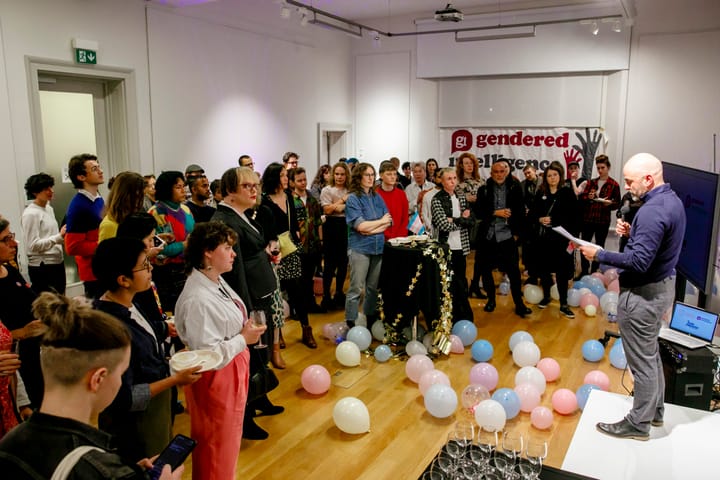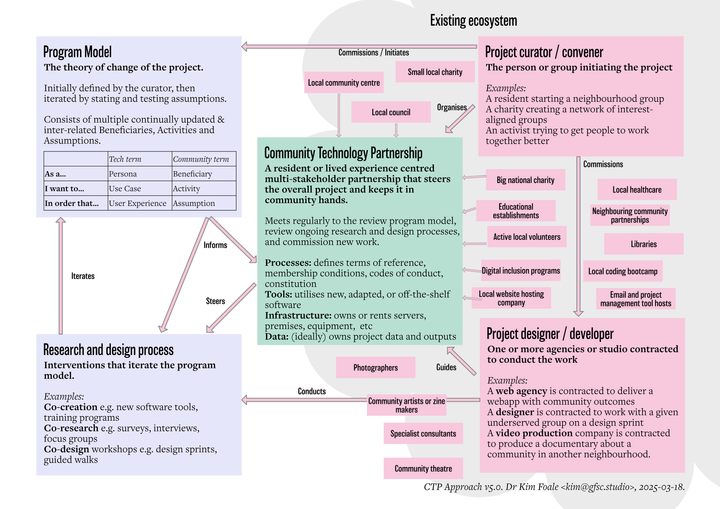Our plan to build bottom-up resistance to billionaire technology
We shouldn't need platforms owned by the biggest losers on the planet to live happy, healthy, connected lives. Our fledgling network of technologists and organisers aims to make tech billionaires obsolete by co-creating our own means of production.

GFSC want to create a culture where communities own and operate their own community technology as a normal part of community life. We shouldn't need platforms owned by the biggest losers on the planet to live happy, healthy, connected lives: indeed the deliberate design of big tech is to divide and conquer our attentions, communities, and wallets.
Our entire language, practice and culture around technology in 2025 is almost completely synonymous with the extremes of the global capitalist military-industrial-surveillance state. Our first article on community technology partnerships in 2017 highlighted a problem which has now got exponentially worse, with corporate ownership of our lives and attentions getting more and more invasive by the day.
‘The Startup’ is the business model that has transformed the world over the last couple of decades. In this model, speculative financiers (generally unhinged genocidal billionaires like Peter Thiel) invest lots of money in small companies, generally through dedicated schemes like Y Combinator. The company then gets a few years of trying to identify a use case that can be scaled globally and aquire a user base that's worth something to someone, before selling the entire company (generally to a big-five tech company), or floating on the stock market (an ‘IPO’).
This model is so prevelant that almost all our modern idea of what tech is has come from this “move fast and break things” culture, which has now done it's job and broken democracies all over the world. If you wonder why you now have a dozen monthly subscriptions and everything is increasingly computerised and automated but nothing works, this is why: it's very good for business. There are a ton of routes to finance the new Uber, but none to create the new Wikipedia.
So what does the resistance look like?
Creating community technology outside of this speculative finance bubble is very hard. Money for it is hard to come by, with community grants often not wanting to spend on technology, and technology grants not understanding or valuing community outcomes.
GFSC have spent the last couple of years building connections with other UK tech studios, co-ops, not-for-profits and individual tech activists and organisers. We've also been building connections with networks of community groups up and down the country.
Tech Partners
Our current group of makers and do-ers is as follows. This section is included to capture a full snapshot of where we are now, but if you like you can skip to the “What are the barriers holding us back?” heading where the discursive bit resumes.
- GFSC, who as well as this blog have made PlaceCal, a community information and events aggregator, which has now spawned The Trans Dimension and Fruit Salad Events building on it's API.
- Common Knowledge, a worker co-op focussing on political movement building, who have made Mapped, a tool which helps visualise organisations’ memberships geographically and see who their local decision makers are.
- Resilience Web, a platform and campaign which helps create holistic visualisation of environmental and social justice groups in a place, curated by people who live there. (They are also using the PlaceCal API to load event info too!)
- Karrot, a free and open-source tool for grassroots initiatives and groups of people that want to coordinate face-to-face activities on a local, autonomous and voluntary basis.
- Tipping Point, an environmental grassroots movement who have created the Tipping Point Tech Hub, a shared collection of SaaS tools for groups that couldn’t otherwise afford them to have access to e.g. a large Zoom room and common organising platforms like Action Network and Zetkin.
- Autonomic, a worker co-op specialising in getting community organisations up and running with adapted off-the-shelf open source solutions. They have developed Co-op Cloud, a software stack that aims to make hosting libre software applications simple for small service providers. This gives us an affordable, stable and secure way to access the entire open source ecosystem.
- Mastodon, a federated microblogging platform who are currently forming a new non-profit governance structure that provides a community-owned alternative to platforms like X, Threads and Bluesky.
- Name.pn, a simple webservice to share your pronouns and name pronunciation developed by Fish Percolator.
- We are also working with Fractals, Lutalica and Profit for Purpose Digital, three other community tech studios without a specific community tool but with experience in delivering all the above for community groups.
Over the coming months we'll be working on more profiles and features on this little gang. If you'd like to join us then as always, get in touch.
Community Partners
Through GFSC’s work on PlaceCal, we have discovered a huge range of community organisers who are desperate for good community technology to organise their network. Some examples of these are:
- Grassroots groups supporting transgender people, and LGBTQ+ people more broadly
- Parent and child groups
- Live comedy and theatre performers
- Institutions like museums who want to create a community of practice around their institutions
- Place-based neighbourhood projects in areas like Norwich, Mossley and Moss Side
- Networks of community businesses and social enterprises, often managed by VCSE-type organisations
- Co-housing projects who want to create a community around the project
- Community artists and galleries
- Health information networks e.g. around GPs surgeries and communities for specific health issues like kidney disease
- It's important to note our above tech partners are also active organisers in non-tech communities across the country including in Edinburgh, Leeds, Manchester, Newcastle, Cambridge, London, Leeds, etc.
It's still early days but we will be publishing more specifics about our work here as we go.
What are the barriers holding us back?
We have had some successful pilots but found some real barriers to deep adoption. As mentioned in the introduction, the impact of massive amounts of speculative finance and the infrastructure and culture to support it has made it very hard to create alternatives. Tech is the engine that drives capitalism, and the two are so intertwined it's hard to step out of that and create community economies.
So, what are the biggest issues for community technologists trying to scale and grow their alternatives to big tech?
We can't hope to match big techs' level of polish
Community technology is not nearly as polished as corporate platforms due to not having millions spent on user interface design. I estimate the average community tech initiative has 1% of the finance available to it a startup does. This means we can't do it on our own, and that any rollout of any new community tech needs to fix bugs and adapt software for each new group that uses it. This is expensive and time consuming, and requires tolerance of a level of friction people can be unwilling to overcome.
Of course the flip side is that the code is then generally free and open source and can be worked, adapted and ownedby the wider community – but getting to the point there's a desire for an ecosystem is a long and winding route.
Community groups don't have capacity to experiment
Community organisers didn’t have the time to engage with us that they would like. Even where there was an urgent need and desire to use community alternatives, putting time aside to try something new and experimental was a luxury most community groups don't have in the current climate.
Exacerbating this, groups had often tried a handful of commercial solutions and were burnt out on trying new things. Even if we have something perfect is there really energy for the 6th attempt at fixing any problem – or shall we just get by with our WhatsApp groups and poorly maintained spreadsheets? We often had to do a lot of hands-on tech support to deal with urgent problems to get them in a space they were ready for something new.
Tech methodologies are adapted from ones to sell products, not to help people
The tech industry has a mature culture and well-established methodologies around making for-profit products that are targeted at removing pain for individual businesses or people, but is inherently predatory and the process of “enshittification” is now well documented. This applies just as much to the charity-industrial-complex as well, with many methodologies being designed so that the Bezos or Gates foundations have some nice tax writeoffs that look good on the press release while maintaining their billions and the global status quo.
This means that we don’t have identified culture or practice around building community technology which is owned by everyone, fits into existing social structuers, and is governed by wider social consent. The lack of a model to do this with means we struggle to manage expectations with community groups and create reciprocal iterations between community need and actual software.
What does this mean for rolling out community technology?
We all have software we think would be extremely helpful but are all having to fend for ourselves and find our own clients which is effectively impossible - even the most perfect open source office suite in the world can’t compete with Microsoft’s sales team!
As we havn’t yet reached this ‘network effect’ critical mass, we are struggling to create sustainability in the community tech space in terms of wealth, reliable income, and employment. There are very few funds out there for this work at the moment, and sadly we are all in competition to get it. If we are going to grow, we need to work out how we can work together to find new audiences for this work and create sustainable models that let us displace big tech through the power of cooperation.
Perhaps the biggest problem is we have no idea how this should feel yet. As community activists trying to build shared solutions with communities we are part of, we are not salespeople plugging products, but invested citizens invested in addressing social problems that affect our lives. The idea that if someone has an issue with some software we make we can change it for them is profoundly alien: in all our fieldwork we have spoken to nobody whose employer allows input into the software used to do the job, for example. In other words: we need to develop a culture and infrastructure around tech co-ownership and co-production, and move away from our current one of sales and customers.
What we want to do now
TL;DR: we want to create a culture where community technology is a core part of community organising, and divest from billionaire platforms by creating our own sustainable organisations and tools.
Over the next three years, we want to:
- Invite community and tech groups together to demonstrate what they’ve made and have a think about what they all need or could benefit from, perhaps like our UnTechCon festival we ran in 2022.
- Create a shared resource about what the burning issues are community groups are facing, what their objections to using community alternatives might be, and would need to be altered for it to work
- Maintain shared spaces for people to come and get tech support to build community technology (i.e. Discord, Zoom events, Mastodon)
- Support grassroots community groups' tech literacy on their own terms
- Fund community groups and tech groups to have the time and space to experiment
- Work out how to meaningfully evaluate the impact of divesting from big tech
We'd love you to get involved. As usual you can support us with a donation, join our community, or just leave a comment.




Comments ()